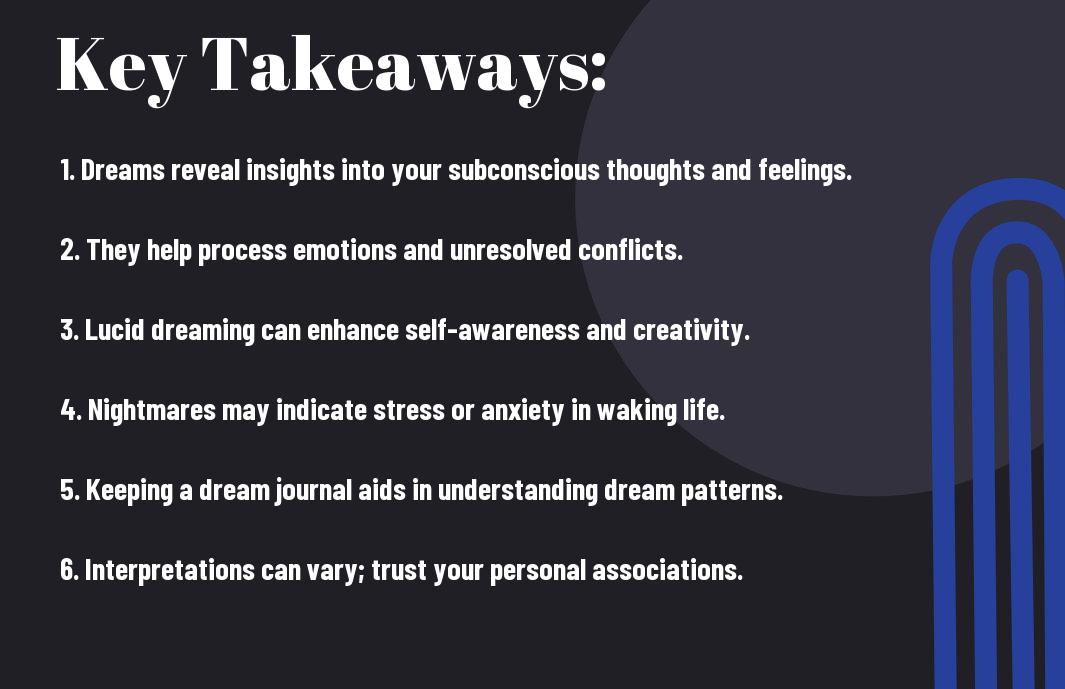Most people underestimate the profound insights that their dreams can provide about their subconscious mind. By delving into your dreams, you can uncover hidden emotions, desires, and unresolved issues that shape your waking life. This blog post will guide you through the fascinating landscape of your dream world, helping you to interpret the symbols and themes that emerge while you sleep. Understanding your dreams is not just an intriguing pursuit; it can be a powerful tool for personal growth and self-awareness, enabling you to harness the power of your own mind.


The Science of Dreams
A fascinating intersection of psychology and neuroscience, the science of dreams researchs into the intricacies of how your brain creates vivid narratives during slumber. Understanding these mechanisms not only opens the door to appreciate your nightly escapades but also reveals deep insights into your subconscious mind. By studying dream patterns and cycles, you can gain valuable context about your thoughts, emotions, and experiences that might otherwise remain suppressed in waking life.
The Sleep Cycle
On average, your sleep cycle lasts about 90 minutes, alternating between different stages of sleep, including light sleep, deep sleep, and REM sleep. Each stage plays a crucial role in overall rest and recovery, and understanding this cycle can enhance the quality of your sleep and how you process experiences during dreaming.
REM Sleep and Dreaming
To unlock the mysteries of your dreams, you must first understand the significance of REM (Rapid Eye Movement) sleep, where most vivid dreaming occurs. This stage is crucial for emotional regulation, memory consolidation, and creative problem-solving, making it vital for both mental and physical well-being.
This phase of sleep is characterized by rapid eye movements, increased brain activity, and temporary muscle paralysis. During REM sleep, your brain generates dreams that can range from mundane to fantastical, often reflecting your thoughts and feelings. Engaging with these dreams can help you explore unresolved issues or creative ideas, allowing you to harness the full potential of your subconscious mind. By paying attention to your dreams, you empower yourself to uncover insights and make connections that enrich your waking life.
The Subconscious Mind
Any exploration of the human psyche reveals the profound impact of the subconscious mind on your experiences and decisions. This enigmatic part of your mind functions beneath your conscious awareness, processing emotions, memories, and beliefs that shape your reality. Understanding this hidden realm can offer you greater insights into your thoughts and behaviors, empowering you to harness its potential to enrich your life.
Definition and Role
Mind refers to the part of you that operates below the level of conscious awareness, encompassing thoughts, memories, and instincts that influence behavior and perception. The subconscious mind acts as a vast reservoir, storing experiences and beliefs that can silently dictate your responses to everyday situations. By recognizing its role, you can begin to gain control over your unconscious habits and reactions.
How It Influences Behavior
Influences from the subconscious mind can manifest in various ways, shaping your beliefs and actions without your conscious understanding. Often, it affects your decisions through automatic associations, emotional responses, and instinctive reactions that you may not even be aware of. Recognizing these influences allows you to identify patterns in your behavior that may not serve your best interests.
Another crucial aspect to consider is how the subconscious mind processes information through learned behaviors and emotional conditioning. Past experiences, whether positive or negative, contribute to your inner narrative and build a framework for how you interpret and react to the world around you. By becoming aware of these subconscious patterns, you can actively work to reprogram harmful beliefs and foster a more positive mindset, ultimately transforming your behaviors and experiences in a meaningful way.

Types of Dreams
After exploring the incredible world of dreams, it’s vital to understand the various types you may experience. These can range from ordinary reflections of your daily life to extraordinary events that capture deep emotions. Here are some common types of dreams:
| Type of Dream | Description |
| Lucid Dreams | You become aware that you are dreaming and can control the dream. |
| Nightmares | Intense dreams that provoke feelings of fear or anxiety. |
| Recurring Dreams | Dramatic dreams that repeat over time, often revealing unresolved issues. |
| Daydreams | Productive visions that occur while you are awake. |
| Prophetic Dreams | Dreams that seem to predict future events or outcomes. |
Recognizing the type of dreams you have can enhance your understanding of your subconscious mind. For more insights, visit The Power Of Dreams – Psychology and Self Improvement.
Lucid Dreams
One fascinating type of dreaming you may experience is lucid dreaming, where you become aware that you are in a dream state. This awareness allows you to potentially influence the dream’s direction and events, granting you the unique ability to explore your subconscious desires and fears actively. Many people enjoy this experience as it can be both entertaining and enlightening.
Nightmares and their Meanings
On the other hand, nightmares can be a troubling aspect of your dream life, often reflecting deep-seated fears or stress. These unpleasant dreams can leave you feeling anxious upon waking and may require some introspection to understand their underlying meanings.
For instance, if you frequently dream of being chased, it may symbolize feelings of anxiety or a situation you’re trying to escape in your waking life. By examining these recurring themes, you can gain invaluable insights into your emotional state and personal challenges, helping you work through them effectively.
Interpreting Dreams
Despite their often enigmatic nature, dreams can offer valuable insights into your subconscious mind. By learning to interpret the messages hidden within your dreams, you can unlock a deeper understanding of your emotions, desires, and experiences. Each dream can serve as a window into your psyche, helping you to navigate your waking life with greater clarity and intention.
Common Symbols and Themes
Dreams frequently feature common symbols and themes that resonate universally. These may include elements like water, which often represents emotions, or flying, signifying freedom and aspiration. By recognizing these symbols in your dreams, you can begin to decipher the underlying messages they convey, providing you with greater insights into your personal journey.
Techniques for Interpretation
Interpreting your dreams requires a blend of self-reflection and understanding of symbolic meanings. Start by keeping a dream journal, recording your dreams immediately upon waking to capture their nuances. This practice allows you to notice patterns over time. Additionally, consider how the symbols relate to your own life experiences and emotions, as your personal context plays a critical role in interpretation.
To deepen your dream interpretation skills, engage in active self-reflection by asking questions about the elements within your dreams. Consider what emotions arose during the dream and how they connect to your current circumstances. You might also explore resources such as dream dictionaries for symbolic meanings, while always focusing on your unique experiences to ensure a personal connection with the interpretations. This can guide you toward more profound insights and understanding of your subconscious desires and fears.
The Importance of Dream Journals
Once again, you are reminded that keeping a dream journal is a vital tool for deciphering your subconscious mind. Recording your dreams not only enhances your dream recall but also allows you to track recurring themes and symbols, empowering you to unlock deeper messages from within. For further guidance, consider exploring The Power of Dreams: How to Interpret & Focus the Energy ….
Recording Your Dreams
Any moment after waking, you should reach for your journal and jot down your dreams while they are still fresh in your mind. This practice deepens your connection with your subconscious, helping you capture intricate details and emotions that often fade with time. As you document your dreams consistently, you’ll cultivate a wealth of information that can lead to significant insights about yourself.
Analyzing Patterns
Importance lies in identifying patterns within your dreams, as they can reveal recurring themes and unresolved issues in your waking life. By recognizing these patterns, you empower yourself to confront fears, embrace desires, or uncover hidden aspects of your personality, which paves the way for personal growth.
To effectively analyze patterns in your dreams, regularly review your journal entries and look for similarities in imagery, emotions, or situations. Consider how these elements might correlate with your daily experiences or feelings, and ask yourself what they could be signaling about your current state of mind. This reflective practice will provide you with valuable insights and guidance in navigating your emotional landscape.

Practical Applications of Dream Work
All around you, the practice of dream work serves as a powerful tool to unlock your subconscious mind and enrich various aspects of your life. By harnessing the insights provided through dreams, you can enhance personal growth, confront underlying fears, and gain a deeper understanding of your emotional landscape. Engaging in dream analysis not only facilitates self-discovery but also paves the way for healing and transformation in your waking life.
Personal Growth and Self-Discovery
With each dream you encounter, you have the opportunity for profound self-discovery. Analyzing your dreams allows you to investigate into your innermost thoughts and feelings, revealing aspects of yourself that you may not consciously recognize. Embracing this journey can lead to personal development, providing you with clarity and insight into your goals, desires, and authentic self.
Addressing Fears and Trauma
To confront and overcome the fears and traumas that may hinder your progress, you can use dream work as a therapeutic tool. Engaging with your dreams allows you to face these troubling emotions in a safe environment, empowering you to work through them at your own pace.
Addressing fears and trauma through dreams can be a transformative process. By interpreting and analyzing nighttime imagery, you can gain insights into the root causes of your discomfort. This approach not only helps you identify patterns related to past experiences but also encourages a compassionate confrontation with those emotions. As you unravel these layers, you create the space for healing and growth, ultimately reclaiming your sense of safety and well-being in your waking life.
Final Words
To wrap up, understanding the power of your dreams unlocks a deeper connection to your subconscious mind, revealing insights into your emotions, desires, and unresolved issues. By paying attention to the symbols and narratives within your dreams, you can gain clarity and foster personal growth. Embrace this unique avenue of self-discovery, as it can guide you towards a more fulfilled and intentional life, enabling you to harness the wisdom hidden within your nightly visions.
